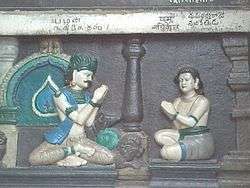Nachiketa
Nachiketa (Sanskrit: नचिकेत) also known as Nachiketā (Sanskrit: नचिकेता, Bengali: নচিকেতা Odia:ନଚିକେତା) or Nachiketas (Sanskrit: नचिकेतस्) was the son of the sage Vājashravas (Sanskrit: वाजश्रवस्, lit. famous for donations) also known as Vājashravā (Sanskrit: वाजश्रवा) is the child protagonist in an ancient Hindu fable about the nature of the soul and Brahman. The story is told in the Katha Upanishad (c. 5th century BCE), though the name has several earlier references. He was taught Self-knowledge, the separation of the human soul (the supreme Self) from the body, by the god of Death, Yama. Nachiketa is noted for his rejection of material desires which are ephemeral, and for his single-minded pursuit of the path of realizing Brahman / Moksha i.e. emancipation of the soul from rebirth.
Etymology
The word 'Nachiketa' has various meanings which are interrelated with its other meanings.
- That which is unperceived.
- The quickening Spirit that lies within all things like fire, latent in wood, the spirit that gives, the unquenchable thirst for the unknown.[1]
- Sacred fire.
- The one who is continuously looking for nothing but an unending spiritual energy.
Earlier references
The Rigveda 10.135 talks of Yama and a child,[2] who may be a reference to Nachiketa.[3] He is also mentioned in the Taittiriya Brahmana, 3.1.8[3] Later, in the Mahabharata, the name appears as one of the sages present in the Sabha (royal assembly) of King Yudhishthira (Sabha Parva, Section IV,[4]) and also in the Anusasana Parva (106[3]). However, the primary story, dealing with the dialogue between Nachiketa and Yama, comes from the later Katha Upanishad, which is summarized below.
Katha Upanishad: Nachiketa and Yama

Vājashravasa, desiring a gift from the gods, started an offering to donate all his possessions. But Nachiketa noticed that he was donating only the cows that were old, barren, blind, or lame;[5] not such as might buy the worshiper a place in heaven. Nachiketa wanting the best for his father's rite, asked: "I too am yours, to which god will you offer me?". After being pestered thus, Vājashravasa answered in a fit of anger, "I give you to Death (Yama)".
So Nachiketa went to death's home, but the god was out, and he waited three days. When Yama returned, he was sorry to see that a Brahmin guest had been waiting so long. He told Nachiketa, "You have waited in my house for three days without hospitality, therefore ask three boons from me". Nachiketa first asked for peace for his father and himself. Yama agreed. Next, Nachiketa wished to learn the sacred fire sacrifice, which also Yama elaborated. For his third boon, Nachiketa wanted to learn the mystery of what comes after death.
Yama was reluctant on this question. He said that this had been a mystery even to the gods. He asked Nachiketa to ask for some other boon, and offered many material gains.
But Nachiketa replied that material things will last only till tomorrow. He who has encountered Death personally, how can he desire wealth? No other boon would do. Yama was secretly pleased with this disciple, and elaborated on the nature of the true Self, which persists beyond death. The key of the realization is that this Self is inseparable from Brahman(mind), the supreme spirit, the vital force in the universe. Yama's explanation is a succinct explication of Hindu metaphysics, and focuses on the following points:
- The sound Om! is the syllabus of the supreme Brahman
- The Atman, whose symbol is Om is the same as the omnipresent Brahman. Smaller than the smallest and larger than the largest, the Soul is formless and all-pervading.
- The goal of the wise is to know this Atman.
- The Atman is like a rider; the horses are the senses, which he guides through the maze of desires.
- After death, it is the Atman that remains; the Atman is immortal.
- Mere reading of the scriptures or intellectual learning cannot realize Atman.
- One must discriminate the Atman from the body, which is the seat of desire.
- Inability to realize Brahman results in one being enmeshed in the cycle of rebirths. Understanding the Self leads to moksha
Thus having learned the wisdom of the Brahman from Yama, Nachiketa was freed from the cycle of births.
Influence
Nachiketa has been one of the most influential characters in Hinduism. Indian monk Swami Vivekananda said: "If I get ten or twelve boys with the faith of Nachiketa, I can turn the thoughts and pursuits of this country in a new channel."[6]
See also
References
- ↑ Sri Krishna/16
- ↑ "The Rig Veda, Hymn 10.135". Free media library. 2005-09-19. Retrieved 2014-04-06.
- 1 2 3 Radhakrishnan, S. (1994). The Principal Upanishads. New Delhi: HarperCollins Publishers India. ISBN 81-7223-124-5 p. 593.
- ↑ Mahabharata, Book 2, Sabha Parva Mahabharata, Book 2, Section IV, sacred-texts.com. p. 7.
- ↑ Swami Prabhavananda and Frederick Manchester, Breath of the Eternal http://www.atmajyoti.org/up_katha_upanishad_text.asp
- ↑ "Swami Vivekananda on Nachiketa". Swami Vivekananda Quotes. Retrieved 4 April 2014.
- Sister Nivedita & Ananda K.Coomaraswamy: Myths and Legends of the Hindus and Bhuddhists, Kolkata, 2001 ISBN 81-7505-197-3
- Sri Krishna Prem: The Yoga of the Kathopanishad, London, John M. Watkins, 1955 (No ISBN)
- Swami Krishnananda.org
- A History of Pre-Buddhistic Indian Philosophy By Benimadhab Barua
- Encyclopaedia of the Hindu world By Gaṅgā Rām Garg
External links
| Wikisource has original text related to this article: |
- The Mahabharata, Book 13, Anusanana Parva sacred-texts.com
